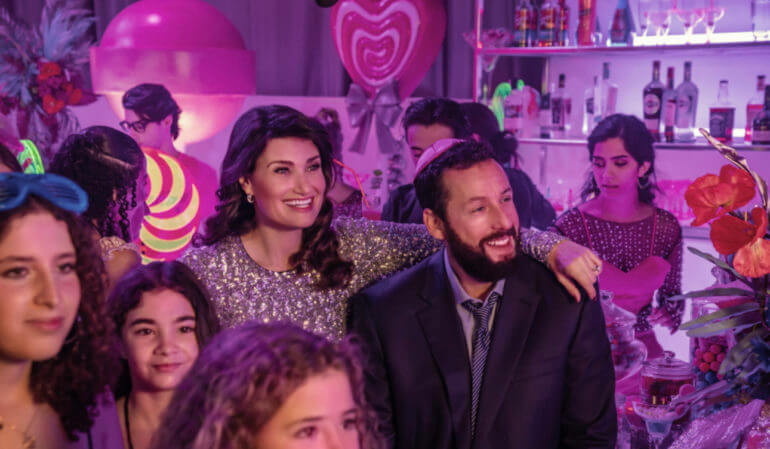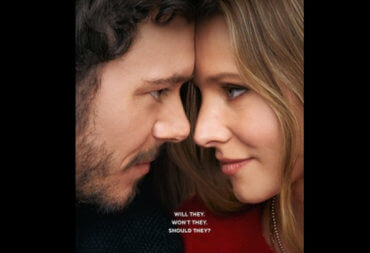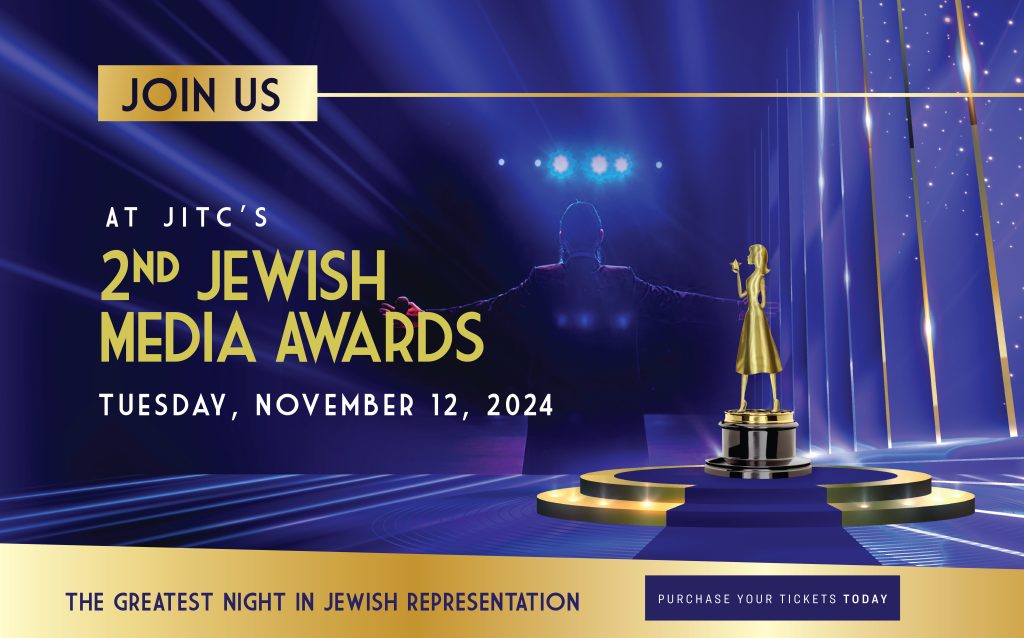
“You’re So Not Invited To My Bat Mitzvah” Exudes Jewish Pride
“I’m really glad I’m a part of this.”
In Adam Sandler’s new Netflix film, You’re So Not Invited To My Bat Mitzvah, for me the line that summed up the essence of the film, was when protagonist Stacy Friedman declared at the end, “I’m really glad I’m a part of this.” What is the “this?” When she utters these words, she is selling challah for tzedaka (charity) at Hebrew School, surrounded by her Jewish community, so she means that moment, but I believe she also means “being Jewish” in general. And in an age when too many Jews downplay their Jewishness, hide it, feel ashamed by it, wish to escape from it, this was a really nice theme to be normalized and popularized by the real life daughter of a beloved Jewish celebrity.
This sentiment is not so common in your typical Hollywood Jewish portrayals. Far too often, being Jewish is seen as a liability in some way. It makes the character weird or unappealing. Jewish practices are often shown to be embarrassing, the identity is full of guilt or shame. The Torah is sometimes highlighted as backwards and archaic.
When I heard this film was coming out, I didn’t have high hopes. I was afraid it would be your typical shallow, cringy film showing wealthy Jews mocking their Jewish identity. It wasn’t perfect in terms of Jewish representation, but when I think about the goals that our JITC Hollywood Bureau is advocating for and trying to create a universal standard for – to prevent the typical tired tropes and increase stories of Jewish pride and joy, and whole characters that exist beyond Jewish punchlines, this movie got many things right.
Here are my favorite parts of the film from a Jewish representation perspective:
- Adam Sandler loves being Jewish. He is comfortable in his Jewish skin. He is comfortable wearing a yarmulke. That confidence and love of his identity is felt throughout the film in his role as Danny Friedman.
- Idina Menzel’s character, Bree, is not an overbearing Jewish mother. She is a loving mother. She’s not a Jewish American Princess either. She wants to get the sensibly priced bat mitzvah dress, which doesn’t feel cheap. It feels like a pushback to all the materialistic Jewish women we usually see on screen.
- The Jewish casting is quite authentic. There were a lot of actual Jews cast to play Jews in the film.
- The Jewish casting was diverse. The film showed that Jews can come in a variety of ethnic and racial backgrounds.
- There were no nebbish Jewish men in the movie.
- Jewish people were depicted as desirable as opposed to gross. The heartthrob, Andy Goldfarb was a cute Jewish boy who wore a big Jewish star all the time and a yarmulke at Hebrew school. Yeah, he was a bit of a jerk, but not in a stereotypical way. The protagonists, the Friedmans, were comprised of a Jewish woman married to a Jewish man. This is often does not happen in shows or movies about Jews. Happily married Jewish couples sends a message to viewers that it’s OK to marry Jewish.
- It was nice to see God have an important role in a movie. You rarely see Jews talking to God sincerely in modern media. It had a cheesiness to it, but this was a movie about adolescent girls, full of period jokes. This is an awkward stage of life, so there was a cheesiness in a lot of the film, but it didn’t take away from the positive Jewish vibe, or the idea that Stacy Friedman reached out to God when something was on her mind.
- It was nice to see the Torah get a starring role in a film. I was raised as a Conservative Jew who became Orthodox in my teens, so while girls don’t read from the Torah in my current community, it was cute to hear Torah verses being chanted throughout the film as a point of pride as opposed to mockery.
- Someone noticed the details in the film, like Stacy pointing to the correct words while she was reading from the Torah. I appreciated that.
- I loved the Yiddish peppered throughout the film: bubbeleh, tateleleh, shane punim – whoever was involved with these choices in the script was probably called some of these terms of endearment by an older Jewish relative. It was very sweet.
- The Friedman family, played mostly by Adam Sandler’s family, is a happy, stable, solid family. We don’t see neurotic or anxious or scheming Jews. Just normal people passing good values and Jewish traditions onto their kids.
I don’t have many complaints, but here’s where the film could have done better in terms of Jewish representation:
- The bat mitzvahs are over the top, which screams “wealth.” The Jewish homes are pretty big and lavish overall, which also screams “wealth.” However, I understand that from a film perspective, viewers want to see something big and exciting at these parties, and they also want to see big, beautiful homes as backdrops. It just gets complicated when Jews are already associated with wealth. The Friedman parents saying “no” to Stacy on a few occasions, including when Danny (Adam Sandler) explains how simple his bar mitzvah was and that the theme was “being Jewish,” was meant to counter some of the examples of wealth. The Friedman home was also less lavish than some of the other homes. Some more simple parties and homes in the mix might have been helpful too.
- I didn’t get the Christian Mateo character really. He was supposed to be more of a moral or mature voice, but it was a bit of a strange choice to give that role to a non-Jew. I would have loved if that character was a more observant Jew, who brought maturity into the mix based on having more knowledge of Jewish sources or practices. There is something nice about someone non-Jewish appreciating Jewish culture, so that is one plus for his character.
- The rabbi was pretty cringy. It’s a comedy, so there needs to be comic relief. I didn’t love that the rabbi was so awkward, but she wasn’t a bad person in the movie. Just kind of annoying.
- Probably my biggest complaint about the film isn’t even a complaint. It’s noting that there was a missed opportunity to bring some Jewish wisdom into the ending, a Torah lesson from an actual source that helped resolve the tension and could leave the viewers inspired. There could have been a Jewish takeaway that was deeper than the typical platitudes of “be altruistic,” “practice kindness,” “give others the benefit of the doubt.” Those are great Jewish values, but they’re also great human values.
Now I get that I’m being a bit nitpicky here with this last point. But since Adam Sandler is leading the way in avoiding tropes and displaying Jewish pride and joy, pride and joy that he’s been leading the way with since The Chanukah Song, I’d like to humbly suggest that he raise the bar even higher the next time and include Jewish wisdom too.
What could the ending have looked like with Jewish wisdom? If there was a character who was respected and knew Jewish sources, he or she could have looked at Stacy wallowing in her multiple failures and told her, quoting Proverbs, “sheva yipol tzadik va’kam,” which literally means, “seven times a righteous person falls and gets up.” Figuratively what this means is contrary to popular belief, righteous people don’t get that way by always being perfect. It is actually in the act of falling and getting up and falling and getting up and falling and getting up yet again that true righteousness is born. This is message could have left both Stacy and the audience a bit more enlightened.
I understand the Jewish pride a la The Chanukah Song. That was the kind of pride my mother instilled in my sisters and me growing up. It is great to feel like Jews are a special people. We don’t see that enough in popular media. But there is a deeper Jewish pride that is felt when Jews realize that we have ancient wisdom that is relevant and meaningful in modern times. And films, even somewhat cheesy bat mitzvah comedies, can be conduits for bringing that deeper Jewish pride to the world. (Adam, if you like this suggestion, give us a call for your next project. We can help!)
If you found this content meaningful and want to help further our mission through our Keter, Makom, and Tikun branches, please consider becoming a Change Maker today.










6 comments
Sort by
The movie ends with the main character dancing at her Bat Mitzvah with her new crush – a Catholic boy. As the rabbi, cantor and her parents look on approvingly?!
He’s 5 inches shorter than her. I don’t think it’s a serious thing. I think it’s a dance. And her father is getting used to her growing up. And I wonder if Mateo is actually from the b’nei anusim and in the second film he converts.
I really liked this movie a lot. I thought the Mateo character was interesting. He was a foreign exchange student who ended up in community where all of his friends, most of his classmates (and maybe even his host family) were Jewish. He embraced that fully – learning about beliefs, traditions, rituals, and values, and even language. It’s exactly the meaningful, immersive cultural experience that foreign exchange students are meant to have. Mateo came from a country that likely didn’t have a large Jewish population and used his time in the US to gain understanding, respect, and appreciation for Judaism and Jews. I think he’s a great example of someone from outside the community having very warm and positive feelings about Jewish people and practices – which is exactly what movies like this are supposed to inspire.
I saw a strong Jewish message at the end of the movie – teshuvah. Elul must be really getting to me. 🙂
Did anyone else notice that the Rabbi “crossed” herself at the Bat Mitzvah? I was taken aback by that.
thought it was very interesting the comments